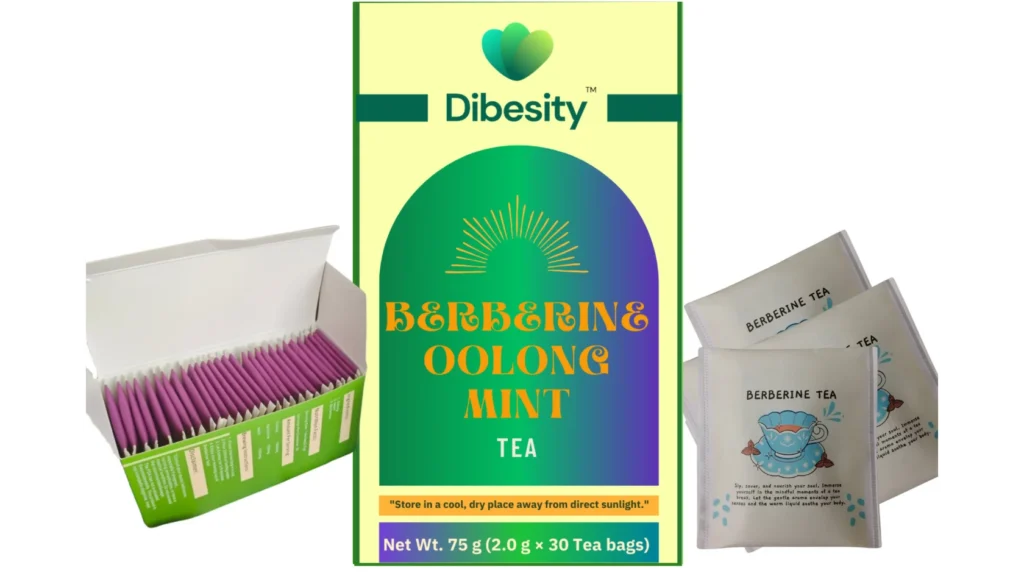Berberine is a naturally occurring compound found in several plants, including barberry, goldenseal, and Oregon grape. Renowned for its bright yellow hue, berberine has a long history of use in traditional medicine systems such as Traditional Chinese Medicine and Ayurveda.
Those ancient practices have harnessed its potential for various health benefits, particularly for digestive issues. This compound is noted for its ability to support gastrointestinal health, making it a popular choice in herbal remedies throughout centuries.
The significance of berberine extends beyond its historical applications; it has gained traction in modern wellness circles for its potential to address common digestive disorders.
People are increasingly seeking natural alternatives to over-the-counter medications, driving interest in organic berberine tea for indigestion and related gastrointestinal concerns. The calming properties of this herbal infusion are believed to aid in alleviating symptoms such as abdominal cramps and GI upset, providing a gentle and effective remedy.
As research continues to unveil the myriad ways in which berberine can support well-being, its potential for addressing issues like IBS, abdominal colic, and other digestive disturbances cannot be overlooked.
The rise in recognition of organic berberine tea for these ailments is indicative of a broader trend toward embracing natural health solutions. By incorporating berberine into daily routines, individuals can explore holistic approaches that aim to enhance digestive comfort and promote overall health.
In the following sections, we will delve into the specific benefits of berberine tea and how it can serve as a powerful ally in addressing various digestive concerns.
Understanding Indigestion and Its Symptoms
Indigestion, often referred to as dyspepsia, is a term used to describe discomfort or pain in the upper abdomen, particularly during or after meals. It is a common digestive issue that affects individuals of all ages. The term encompasses a range of symptoms that can vary in severity and duration, which may lead to confusion among those experiencing it. Understanding the symptoms associated with indigestion is crucial for effectively identifying and addressing the condition.
Common causes of indigestion include overeating, consuming spicy or fatty foods, and drinking excessive alcohol or caffeine. Stress and anxiety, as well as certain medications, may also contribute to digestive discomfort. When the digestive system is not functioning optimally, it can result in a variety of unpleasant symptoms. These might include bloating, which is the sensation of fullness or swelling in the abdominal area, and heartburn, characterized by a burning feeling in the chest that can occasionally radiate to the throat. Other symptoms may involve nausea, flatulence, and abdominal cramps.
For those experiencing gastrointestinal (GI) upset, the symptoms can often overlap with those of indigestion. This may include various forms of abdominal colic, which refers to sharp, gripping pain in the abdomen. If an individual has irritable bowel syndrome (IBS), they may experience exacerbated symptoms, including frequent bouts of discomfort tied to meal times. Recognizing these indicators is essential for individuals to seek appropriate interventions. For some, incorporating natural remedies such as organic berberine tea for indigestion may offer relief by promoting better digestion and easing symptoms. Ultimately, understanding indigestion and its associated symptoms allows for proactive health management and improved quality of life.
Exploring Abdominal Cramps: Causes and Effects
Abdominal cramps are often described as a painful, involuntary contraction of the muscles in the stomach or intestines. These cramps can manifest in various forms, ranging from mild discomfort to severe pain, and may last for a few minutes or several hours. Many individuals experience this phenomenon at some point in their lives, and understanding the underlying causes can significantly aid in managing the discomfort.
One common cause of abdominal cramps is dietary choices. Certain foods may irritate the digestive system, leading to digestive issues such as bloating and gas. High-fat foods, excessive caffeine, and spicy dishes are often linked to gastrointestinal upset. Additionally, food intolerances or allergies can trigger cramps, making it essential for individuals to pay attention to their diet to identify potential triggers.
Stress is another significant factor that can result in abdominal cramps. The gut-brain connection is well-established, wherein psychological stress can impact gastrointestinal health. Stress may lead to conditions like Irritable Bowel Syndrome (IBS), characterized by recurrent abdominal pain and altered bowel habits. For some, acute stressors can provoke sudden bouts of abdominal pain, making it imperative to adopt stress-reducing strategies.
Certain medical conditions can also contribute to abdominal cramps. Inflammatory bowel diseases, such as Crohn’s disease and ulcerative colitis, often present with abdominal pain and cramping. Additionally, disorders like diverticulitis and gastrointestinal infections can cause debilitating cramps, requiring medical intervention. Understanding these underlying health issues is crucial for proper diagnosis and treatment.
Overall, abdominal cramps can significantly affect daily life, hindering one’s ability to engage in regular activities. Chronic discomfort may lead to absenteeism at work or school and decrease overall quality of life. By recognizing the causes and effects of abdominal cramps, individuals can take proactive steps toward managing their symptoms more effectively.
The Role of Berberine in Digestive Health
Berberine, a bioactive compound derived from several plants including the barberry shrub, has gained considerable attention for its role in enhancing digestive health. Various scientific studies illustrate its potential benefits, particularly in alleviating symptoms associated with indigestion, abdominal cramps, and gastrointestinal (GI) upset. The mechanisms behind these beneficial effects are rooted in berberine’s ability to interact with gut microbiota, modulate inflammation, and regulate metabolic pathways.
One of the notable advantages of organic berberine tea for indigestion lies in its ability to improve gut microbiota composition. Research indicates that berberine promotes the growth of beneficial bacteria while suppressing harmful microbes. This modulation of gut flora can help in balancing digestive processes and enhancing nutrient absorption, thereby mitigating symptoms of gastrointestinal distress.
Additionally, berberine exhibits anti-inflammatory properties, which can be particularly useful for individuals suffering from conditions such as abdominal colic or irritable bowel syndrome (IBS). An increase in inflammatory markers often accompanies digestive disorders, leading to discomfort and pain. Berberine’s ability to reduce these markers helps alleviate abdominal cramps and improve overall digestive function.
Moreover, studies have explored the relationship between berberine and the modulation of gut motility. By acting on the enteric nervous system, berberine can help regulate bowel movements, making it beneficial for those experiencing both constipation and diarrhea. This regulatory effect can provide relief from symptoms related to GI upset, making berberine tea an effective remedy for a range of digestive issues.
In conclusion, the incorporation of organic berberine tea into one’s diet presents a natural remedy for enhancing digestive health. Its multifaceted approach—improving gut flora, alleviating inflammation, and regulating gut motility—highlights the therapeutic potential of berberine for those grappling with indigestion, abdominal cramps, and other gastrointestinal ailments.
How Organic Berberine Tea is Made
Organic berberine tea is a soothing and beneficial beverage derived from the bark, roots, and stems of berberine-rich plants such as goldenseal and barberry. The preparation process begins with sourcing these plants from certified organic farms. Choosing organic sources is crucial as it ensures that the plants are grown without harmful pesticides and chemicals, which can compromise both health and flavor. This organic certification also plays a key role in maintaining the integrity of the berberine compounds that contribute to the tea’s efficacy, especially for conditions like indigestion and abdominal cramps.
Once the plants are harvested, the next step is the extraction of berberine. The roots and stems are dried thoroughly to preserve their active components and enhance the potency of the resulting tea. During the drying process, careful attention is given to maintaining optimal conditions to prevent the loss of beneficial properties, which are imperative for addressing gastrointestinal discomfort, including GI upset and abdominal colic.
To brew organic berberine tea, users typically start with the dried plant material, which can be either whole or ground. The recommended method involves steeping one to two teaspoons of the dried herb in hot water for 10 to 15 minutes. This steeping process allows the berberine to infuse into the water, creating a flavorful and health-enhancing tea. Those struggling with irritable bowel syndrome (IBS) may find this tea particularly soothing as it offers relief from various digestive issues.
By focusing on high-quality, organic sources of berberine, consumers not only enjoy the health benefits of this natural remedy but also contribute to sustainable farming practices. This conscious choice reflects a growing awareness of the importance of organic products in enhancing wellbeing, especially for those seeking alternatives to conventional treatments for digestive ailments.
Brewing the Perfect Cup: Tips and Recipes
Brewing organic berberine tea is an art that requires careful attention to detail to extract the beneficial properties effectively. The foundation for a delightful cup begins with the choice of high-quality organic berberine. It is advisable to select dried berberine root or tea bags specifically formulated for brewing. To ensure the optimal experience, it is essential to pay attention to steeping times, water temperatures, and the correct ratios.
When preparing organic berberine tea for indigestion or abdominal cramps, a general guideline is to use about one teaspoon of dried berberine root (or one tea bag) per cup of boiling water. The temperature of the water should be set to around 200°F (approximately 93°C) to avoid scorching the delicate compounds within the herb. Next, let the tea steep for 10 to 15 minutes. This duration allows the beneficial alkaloids in berberine to infuse into the water adequately, providing maximum effects for GI upset and abdominal colic.
To enhance the flavor of your berberine tea, consider adding natural sweeteners such as honey or agave syrup. Honey not only elevates the tea’s sweetness but also incorporates additional health benefits. Additionally, herbs like ginger or peppermint can complement the tea’s flavor profile. For instance, a thin slice of fresh ginger can add a spicy warmth, while peppermint provides a refreshing twist that may further relieve symptoms of IBS.
For those who prefer a more robust tea experience, blending berberine with a mix of complementary herbs can be quite rewarding. Tea recipes might also benefit from a splash of lemon juice to provide a zingy taste. Ultimately, personalizing your brewing method will result in a more enjoyable experience, contributing to the tea’s appeal as a natural remedy for gastrointestinal discomfort.
Potential Side Effects and Considerations
While organic berberine tea is celebrated for its numerous health benefits, it is essential to consider potential side effects and contraindications associated with its use. Although generally recognized as safe for most individuals when consumed in moderation, there are specific populations who may experience adverse reactions or may need to exercise caution.
Firstly, pregnant and breastfeeding women should consult with a healthcare professional before incorporating organic berberine tea into their diet. There is limited research on the effects of berberine on fetal development, and while it may provide digestive benefits, safety during pregnancy has not been conclusively established. Additionally, nursing mothers should consider the potential effects of berberine on their infants, and thus medical advice is warranted.
Individuals with certain medical conditions should also approach berberine tea with caution. For instance, those with a history of gastrointestinal disorders, such as inflammatory bowel disease (IBD) or irritable bowel syndrome (IBS), should consult a doctor before using berberine tea for GI upset or abdominal colic. Berberine has the potential to alter gut microbiota, which can impact individuals with pre-existing conditions.
Furthermore, those taking specific medications, particularly anticoagulants or medications for blood sugar control, should seek professional advice before trying berberine tea. Berberine may interact with these medications, potentially leading to undesirable side effects. It is crucial for individuals to disclose their complete medication list during consultations to avoid any adverse drug interactions.
In conclusion, while organic berberine tea can be a beneficial addition to managing indigestion, abdominal cramps, and gastrointestinal discomfort, individuals should be aware of potential side effects and consult healthcare providers when necessary to ensure safe and responsible use.
User Experiences: Testimonials and Insights
Numerous individuals have turned to organic berberine tea as a natural solution for various gastrointestinal issues, such as indigestion, abdominal cramps, and GI upset. Personal testimonials reveal the profound and varied effects of this herbal remedy. Many users report significant relief from symptoms associated with irritable bowel syndrome (IBS) after incorporating berberine tea into their daily routines. For instance, a user from California shared that after just a few cups of organic berberine tea, she noticed a remarkable reduction in her abdominal discomfort, stating, “It felt like a wave of calm washed over my stomach. I could finally enjoy my meals without the fear of an upset.”
Similarly, another testimonial described how this tea not only aided in alleviating symptoms of abdominal colic but also promoted a sense of overall well-being. A frequent traveler remarked, “I always carry my organic berberine tea bags when I travel. It has been a lifesaver for my GI upset after meals that I wasn’t accustomed to. Just one cup has stabilized my digestion.” The digestive benefits of berberine tea resonate with many who experience frequent stomach troubles.
In addition to these accounts, there are users who appreciate the gentle, soothing effect of berberine tea on abdominal cramps. A user noted, “During my monthly cycle, I often suffer from severe cramps. Drinking berberine tea not only eases my discomfort but also helps with my digestion, making it a dual-purpose remedy.” This versatility highlights how holistic natural remedies can address multiple health concerns simultaneously.
Overall, the compelling anecdotes shared by users of berberine tea showcase its effectiveness as a natural remedy for digestive challenges. As with any health remedy, individual experiences may vary, but the positive impacts of organic berberine tea for indigestion and related conditions are evident through these shared insights.
Conclusion: Embracing Natural Remedies for Digestive Wellness
In the pursuit of effective solutions for digestive discomfort, organic berberine tea has emerged as a promising natural remedy. This herbal infusion is recognized for its potential to alleviate various gastrointestinal issues, including indigestion, abdominal cramps, and GI upset. By harnessing the power of berberine, a compound extracted from several plants, individuals suffering from conditions such as IBS or abdominal colic may find significant relief.
The consumption of organic berberine tea for indigestion can help to regulate digestion and soothe the gastrointestinal tract. Its anti-inflammatory properties, alongside its ability to modulate gut bacteria, contribute to its effectiveness when addressing symptoms associated with digestive disorders. Furthermore, those who experience abdominal cramps may benefit from the soothing effects of this herbal tea, which may help to relieve tension and discomfort in the digestive system.
In addition to alleviating symptoms, regular consumption of berberine tea for GI upset can promote overall digestive health. This signifies a shift toward more natural means of addressing digestive issues, moving away from reliance on pharmaceuticals that may carry unwanted side effects. By integrating organic berberine tea into a routine, individuals can explore a holistic approach to managing their health.
Embracing natural remedies such as organic berberine tea is not just about treating symptoms but also about achieving long-term wellness. This herbal solution encourages individuals to consider their dietary choices and lifestyle habits as vital components of their overall digestive health strategy. Through mindful consumption of natural options, one can foster a more resilient digestive system and improve quality of life.



